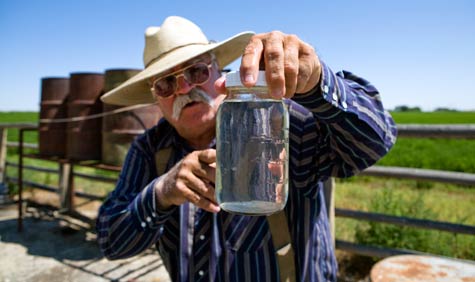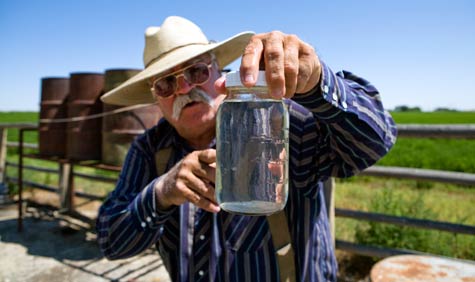 Louis Meeks’ well water contains methane gas, hydrocarbons, lead and copper, according to the EPA’s test results. When he drilled a new water well, it also showed contaminants. The drilling company Encana is supplying Meeks with drinking water.Abrahm Lustgarten / ProPublicaThere’s a scandal brewing about hydraulic fracturing, or fracking, a revolutionary process for extracting natural gas. It involves high-pressure underground blasts that, evidence suggests, could threaten the safety of drinking water.
Louis Meeks’ well water contains methane gas, hydrocarbons, lead and copper, according to the EPA’s test results. When he drilled a new water well, it also showed contaminants. The drilling company Encana is supplying Meeks with drinking water.Abrahm Lustgarten / ProPublicaThere’s a scandal brewing about hydraulic fracturing, or fracking, a revolutionary process for extracting natural gas. It involves high-pressure underground blasts that, evidence suggests, could threaten the safety of drinking water.
Now two of the most intrepid environmental protectors in Congress, Reps. Henry Waxman (D-Cali.) and Ed Markey (D-Mass.), are launching an inquiry. Investigative journalism outfit ProPublica has owned the fracking story and pushed it into the public’s attention. Here’s how they explain it:
What the frack is it?
The process , which forces highly pressurized water, sand and chemicals into rock to release the gas and oil locked inside, gives drillers unprecedented access to deeply buried gas deposits and vastly increases the country’s known energy reserves. [See an illustration.]
What’s the fracking problem?
As ProPublica has detailed in more than 60 articles, the process comes with risks. The fluids used in hydraulic fracturing are laced with chemicals — some of which are known carcinogens. And because the process is exempt from most federal oversight, it is overseen by state agencies that are spread thin and have widely varying regulations.
The diesel connection…
In 2004, the U.S. Environmental Protection Agency examined hydraulic fracturing and determined it can be safe as long as diesel fuel isn’t added to the drilling fluids. The agency based its decision in part on a non-binding agreement it struck with the three largest drilling service companies — Halliburton, Schlumberger and B.J. Services — to stop using diesel.
Newly released documents reveal…
B.J. Services violated that agreement and that Halliburton continued to use diesel in other geologic formations not governed by the agreement. All three companies acknowledged using other potentially harmful chemicals, such as benzene, toluene, ethylbenzene and xylene.
The investigation…
Rep. Henry A. Waxman, D-Calif., who released the information [about Halliburton and B.J. Services] in a statement Thursday, announced that the House Committee on Energy and Commerce, which he chairs, is launching an investigation into potential environmental impacts from hydraulic fracturing.
More from the Wall Street Journal and The Hill. But ProPublica has covered this story more thoroughly than anyone.



